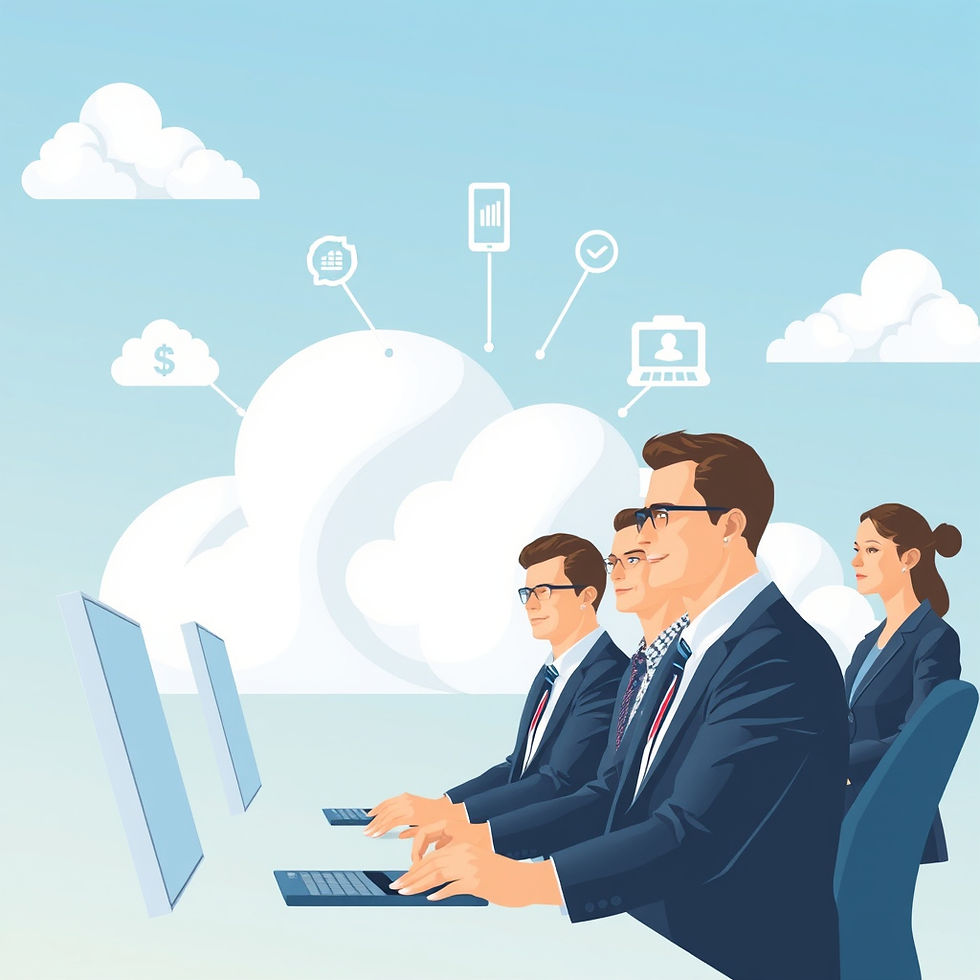Why Your Hybrid Office is a Cyber Goldmine for Hackers (and How to Fix It)
- SystemsCloud

- Mar 12, 2025
- 4 min read
Hybrid work has become the norm, but there’s a downside we don’t talk about enough. Every time an employee logs into your network from their favourite café or a friend’s Wi-Fi, your data security faces a major risk. Hybrid offices are a goldmine for hackers—and if we’re not careful, they’ll exploit every single vulnerability.
But don’t worry, there’s a way to make this work. Let’s dive into what makes hybrid workplaces a hacker’s paradise and, more importantly, how virtual desktops can seal those gaps.

Why Hybrid Work is a Hacker’s Playground
The Wi-Fi Dilemma In a hybrid setup, employees work from anywhere: home, coffee shops, co-working spaces, or even the beach. But not all networks are created equal. Public Wi-Fi networks, especially, are notoriously insecure. A hacker with a bit of know-how and a packet sniffer can grab all the data transmitted over these networks.
What it Means for You: Every insecure login is an open door to your company’s systems. Hackers could intercept login credentials, emails, and sensitive information.Mixing Personal and Professional Devices Many employees end up using personal devices when working remotely, particularly if their work laptop is tucked away at the office. But here’s the kicker: personal devices lack the same level of protection as company-provided devices. If an employee's phone or laptop is infected with malware, it could provide a backdoor into your entire network.
Risk Factor: In 2023, studies showed a 43% increase in malware spread through personal devices used for work purposes.Lack of Physical Security In the office, we have locks, alarms, and CCTV to protect physical assets. But outside? Laptops can be left unattended in cafés, phones can get lost, and home devices can be accessed by others in the household.
Hacker Heaven: Each of these situations creates an easy opportunity for unauthorised access, giving hackers a way in without ever touching a line of code.Outdated Security Practices Hybrid setups often lead to “security fatigue.” Employees forget to update software, overlook multi-factor authentication, or reuse passwords. Cybercriminals love this because it means they’re more likely to crack into accounts.
The Numbers: Research from 2024 highlights that 67% of data breaches involve outdated software or weak passwords—a hacker’s dream setup.How Virtual Desktops Can Seal the Security Gaps
So, how do we make hybrid work as secure as the office? Enter virtual desktops.
Centralised Security—Everywhere Virtual desktops centralise data storage, meaning that data doesn’t actually live on individual devices. Instead, everything’s stored in a secure cloud environment that can be accessed remotely. Even if an employee logs in from a risky Wi-Fi network, the data remains shielded from local threats.
Controlled Access to Company Data Through virtual desktops, IT teams can control who accesses what data and from where. Want to block access from certain countries? Done. Need to enforce multi-factor authentication for logins? Easy.
Added Perk: If a laptop is stolen, the data doesn’t go with it. IT can simply revoke access to the virtual desktop, effectively rendering the device useless from a security perspective.
Consistent Updates and Patches With virtual desktops, software updates and security patches are applied uniformly across all user environments. No more worrying if Jack from marketing skipped his antivirus update. With this setup, IT controls all updates, ensuring everyone’s working with the latest security protocols.
Improved Data Loss Prevention (DLP) Data is at its safest in a virtual desktop environment. For one, IT admins can monitor data transfers, flagging unusual behaviour or stopping data from being downloaded to unauthorised devices. Plus, they can remotely wipe data if needed, safeguarding it from prying eyes.
Reduced Exposure Through Endpoint Isolation Virtual desktops isolate the endpoint (the employee’s device) from sensitive company resources. This is huge in a hybrid model, where the same device may be used for Netflix and spreadsheets. Virtual desktops create a “bubble” that separates work activity from everything else.
Scalable and Cost-Effective for Hybrid Work Virtual desktops provide flexibility without added cost. You don’t have to maintain a separate workstation at home and in the office. Employees can log in from any device with the security of knowing their work is protected and up to date.

Making the Switch with SystemsCloud: A Solution Tailored for Hybrid Work
At SystemsCloud, we’ve tailored our virtual desktop offerings with hybrid security challenges in mind. Our solutions aren’t just about convenience—they’re about creating a hybrid workspace that doesn’t sacrifice security for flexibility.
Around-the-Clock Monitoring: Hackers don’t stick to a 9-to-5 schedule, so neither do we. Our systems are monitored 24/7, ensuring threats are caught before they become disasters.
Compliance and Control: We help you stay compliant with data regulations, whether your team is accessing files from a London flat or a café in Cornwall.
Onboarding and Support: Hybrid setups can be tricky to implement, but we make it easy. We offer onboarding, user training, and responsive support to keep your team secure and your data safe.
Real Benefits We’ve Seen in Hybrid Environments
Reduction in Security Incidents: With virtual desktops in place, our clients have reported a noticeable drop in security breaches and incidents related to remote access vulnerabilities.
Lower IT Costs: Centralised updates mean IT doesn’t have to fix individual devices one by one. Plus, remote troubleshooting is simpler with virtual desktops, saving on-site visits and associated costs.
User Satisfaction: Employees love the flexibility and convenience of virtual desktops, especially when they can work from anywhere without compromising on security.








Comments